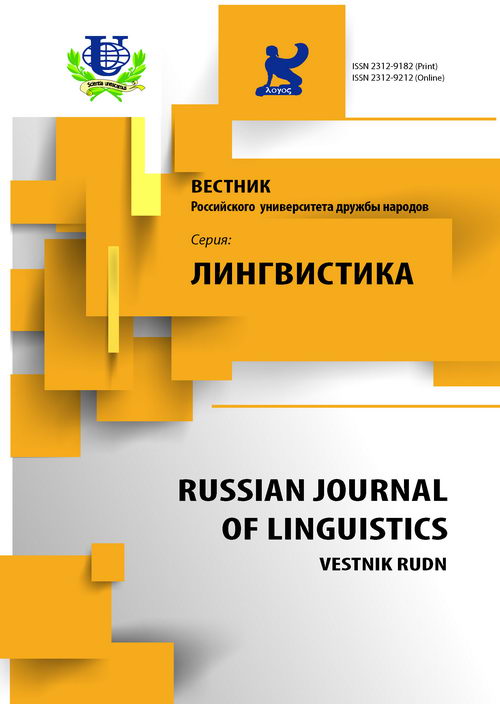Анализ подходов к изучению жанров англоязычного инженерного дискурса
- Авторы: Болсуновская Л.М.1
-
Учреждения:
- Томский политехнический университет
- Выпуск: Том 20, № 1 (2016)
- Страницы: 25-32
- Раздел: Статьи
- URL: https://journals.rudn.ru/linguistics/article/view/9656
- ID: 9656
Цитировать
Полный текст
Аннотация
В статье рассматриваются различные подходы к исследованию жанров. Автор обобщает научные представления о жанрах и подчеркивает, что исследование жанров и жанровой организации научной и профессиональной коммуникации является в настоящее время одной из актуальных проблем современной лингвистики. Инженерный англоязычный дискурс определяется как макросистемный жанрообразующий ресурс профессионального общения в контексте глобальных изменений, происходящих на всех уровнях общественной жизни. Автор также отмечает, что парадигма жанров инженерного дискурса как целостного, комплексного явления окончательно не сформировалась до настоящего времени и требует дальнейших исследований. Признаки и общепринятые нормы жанра объясняются в соответствии с его коммуникативной целью, обусловленной социальным контекстом, в котором производится жанр. Кроме того, автор заключает, что жанровый анализ претерпел изменения и сегодня включает в себя не только изучение специфических языковых признаков, но и анализ социального контекста, культуры, идеологии, организации и деятельности дискурсивного сообщества.
Ключевые слова
Об авторах
Людмила Михайловна Болсуновская
Томский политехнический университет
Email: bolsunovskl@tpu.ru
Кафедра иностранных языков Институт природных ресурсов Национальный исследовательский
Список литературы
- Гусейнова И.А. Коммуникативно-прагматические основания жанровой системы в маркетинговом дискурсе: Дисс. доктора филол. наук. М., 2010.
- Artemeva N. The writing consultant as cultural interpreter: Bridging cultural perspectives on the genre of the periodic engineering report // Tech. Commun. Quart. 1998. Vol. 7. No. 2. P. 285-299.
- Bakhtin M. Speech Genres and Other Late Essays. Austin, TX: Univ. Texas Press, 1986. Transl.: V.W. McGee.
- Bazerman C., Russell D. “Introduction,” in Writing Selves/Writing Societies. Research from Activity Perspectives, C. Bazerman and D. Russell, Eds. Fort Collins, CO: WAC Clearinghouse and Mind, Culture, and Activity, 2003.
- Berkenkotter C., Huckin T.N. Genre Knowledge in Disciplinary Communication. Mahwah, NJ: Lawrence Erlbaum Assoc., 1995.
- Bhatia V.K. Analysing Genre: Language use in Professional Settings. London, U.K.: Longman, 1993.
- Dobrin D. Writing and Technique. Urbana, IL: NCTE, 1989.
- Miller C. Genre as social action // Quart. J. Speech. 1984. Vol. 70. No. 2. P. 151-167.
- Pare A., Smart G. “Observing genres in action: Toward a research methodology”, in Genre and the New Rhetoric, A. Freedman and P. Medway, Eds. London, U.K.: Taylor & Francis, 1994. P. 146-154.
- Schryer C. “The lab vs. the clinic: Sites of competing genres”, in Genre and the New Rhetoric, A. Freedman and P. Medway, Eds. London, U.K.: Taylor & Francis, 1994. P. 105-124.
- Spinuzzi C. Describing Assemblages: Genre Sets, Systems, Repertoires, and Ecologies. Computer Writing and Research Lab. White Paper Series. [Online]. Available: http://www.cwrl.utexas.edu/ blogger/whitepapers/archives/000 007.html.
- Swales J. Genre Analysis: English in Academic and Research Settings. Cambridge, U.K.: Cambridge Univ. Press, 1990.
Дополнительные файлы















